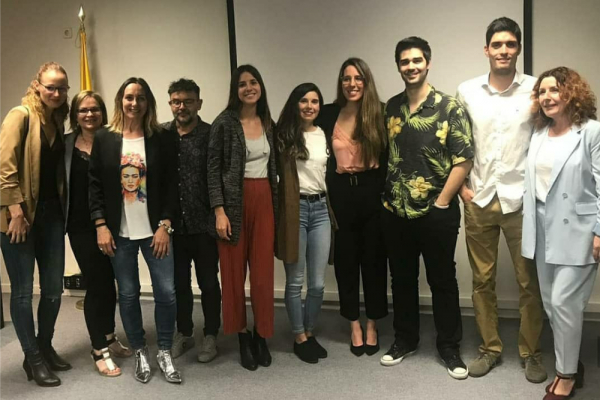FPSM Group: 'The word that could summarize what women express to us is gratitude'
The High Performance Research Group ‘Physiotherapy in Women's Health Processes’(FPSM group) belongs to the Nursing and Physiotherapy Teaching Unit of Universidad de Alcalá. It works to improve the quality of life of women, enhancing their functionality and their physical and emotional well-being.
Many women with different problems benefit from their research. Physiotherapy is essential at different stages of your life, whether it be for preparation, physical and functional recovery and the prevention of dysfunctions associated with physiological processes such as pregnancy, childbirth, postpartum or menopause. It also helps in situations within the curative and palliative process of clinical symptoms (with higher prevalence)in the female gender: Breast cancer, gynecologic cancer, persistent pain or fibromyalgia.
- What are the objectives of the FPSM-Group?
As its name indicates, publicize and promote recognition of the role of physiotherapy in women's health. We participate, through different means of dissemination, in publications of scientific articles, presentations and interventions in national and international congresses and sessions of therapeutic education to women with different health problems. In fact, in 2018 we received the UAH Award for Best Outreach Initiative through a website or social media profile.
We also work in the training of undergraduate, master's and doctoral students in Women's Health through a process that combines physiotherapy based on scientific evidence and clinical experience.
- What research projects are they in place?
We are currently working on physiotherapy research projects in gynecology and obstetrics. In the physiological processes of women, we investigated pregnancy, childbirth and puerperium: Therapeutic exercise in postpartum, prevention of pelvic floor dysfunctions such as urinary incontinence and pelvic organ prolapses after childbirth and menopause, among others. At the pathophysiological level we investigate consequences of cancer processes, pain and alterations of sensitivity, treatment of pelvic floor dysfunctions, among others.
In the same way, we have other lines of research related to dysfunctions of the cardiorespiratory system, problems in venous and lymphatic return circulation. There is also another line that works on disorders of the neuromusculoskeletal system, linked in a special way to pain in women, such as myofascial pain syndrome, persistent pain and fibromyalgia. Finally, we are developing projects in a higher education line, aimed at integrating physiotherapy skills, their acquisition in different teaching environments and in the future of community service through learning-service projects.
We have developed and implemented research projects in the Community of Madrid and Castilla la Mancha, and have established agreements and collaborations with national and international institutions dedicated to women's health care and research. We highlight Genesis Care, the Medical Area III of Madrid (Prince of Asturias University Hospital and health centers of the area), the Central Hospital of Defense Gómez Ulla, the School of Rehabilitation Sciences of the University of Ottawa (Canada), University of the State of Santa Catarina - UDESC in Florianópolis (Brazil), And the 'Association française des masseurs-kinésithérapeutes pour la recherche et le traitement des atteintes lympho-veineuses' (Francia) among others.
- What service do you offer to women?
Women could participate in the research projects developed by the FPSM-Group in the Physiotherapy Research Teaching Unit (UDAIF) of the Physiotherapy Teaching Unit of Universidad de Alcalá. They directly benefit from specialized, individualized, effective and safe physiotherapy interventions, improving their health processes and enhancing their capabilities with a fundamental impact on their basic activities of daily life, as well as on their labor and/or social participation. In addition, the different projects program short, medium and long-term follow-up, which facilitates the integration of treatment and the early approach and prevention of potential problems.
Finally, we offer different therapeutic education sessions that allow women to acquire a wide range of skills related to understanding, self-efficacy and self-care in relation to their health process. It is a service that helps the scientific community with the generation of evidence in the field of Physiotherapy in Women's Health.
- Who can access it?
The usual procedure for accessing research projects is the referral of women from the Gynecology and Obstetrics Service of the Príncipe de Asturias University Hospital in Alcalá de Henares. From this service and from UDAIF itself, the potential stakeholders of the project who are invited to participate are informed, about the procedures and duration of each intervention. Women who access, after signing their consent, to research projects, sessions and workshops in therapeutic education must meet a number of criteria, previously established in each project. All of this, are necessary to achieve a clearer and deeper knowledge about the different processes of women's health. It has an impact on a common good, which could be extrapolable to the whole female population.
However, women who do not meet these characteristics are informed of other options or recommendations for managing their health problem.
- What is the feedback of the people involved in your projects?
The word that could summarize what women express to us, in various ways and means, is gratitude. Many of them were unaware that their health problem could be treated, improved, and even resolved completely. Less so, they knew that Physiotherapy was the profession that was in charge of it.
Most participants value not only the professionalism, training and dedication of the physiotherapists team that serve them, but the daily commitment, affection and personal attention they perceive. These messages help enormously to continue the work of the FPSM-Group, despite the difficulties, mainly related to funding, which any research group faces.
Publicado en: Inglés
